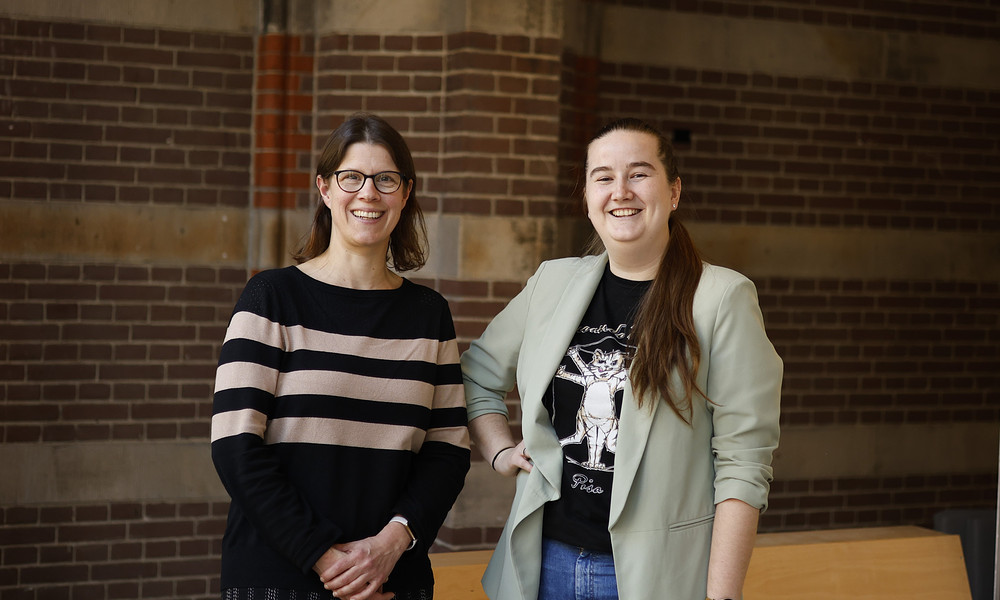Working on the mental health of Groningen’s youth together?
- News

The Institute for Mining Damage Groningen (IMG) pays compensation for immaterial damage to young people. Does this financial compensation alleviate the suffering, grief and stress? Or is more needed to support young people? Professor of Integral Approach to Child Abuse Susan Ketner and researchers Vera Sas and Chantal van der Sluis of the NoorderRuimte knowledge centre conducted research on behalf of the IMG.
In addition to compensating immaterial damage to children, the then State Secretary Vijlbrief (Mining) announced in November 2022 that he would take additional measures to support children and young people in Groningen on top of all existing programmes. The IMG asked the Hanze to conduct research into 'a broad approach to immaterial damage of children and young people in earthquake zones'.
Professor Susan Ketner conducted the research with Vera Sas and Chantal van der Sluis of Built Environment NoorderRuimte. "NoorderRuimte has a lot of knowledge in the earthquake zone," Ketner explains. "By linking knowledge about the earthquake area from NoorderRuimte with my knowledge about youth policy, a great collaboration has arisen."
"We have been doing research in Krewerd for a long time, where the residents and the municipality themselves came up with a plan on how they as a village could solve this in the best possible way," adds Chantal van der Sluis.
The overarching objective of the study was to map the provision of support services and interventions for children and young people in the earthquake zone and to identify how the offer can be improved, so that it better meets the needs of children and young people.
The researchers used a model that is based on the different worlds that children inhabit: family, school, friends, neighbourhood, health and fulfilment. They spoke to experts from all these worlds. Ketner: "People who knew about this from their research role, or from their knowledge of adults or people who have worked with children themselves. Think of earthquake coaches, youth workers, teachers and spiritual caregivers. In the end, we spoke to thirty people."
The researchers did not speak to the young people themselves. "That was outside our remit. At first we thought that was a shame, because it's about young people," says Ketner. "Gradually, we found out that this is not appropriate at all at this stage. This concerns the structure and range of measures and programmes. We did include it as a recommendation. Think of it this way: this research is about the foundation, but young people will soon be able to have a say in what the house will look like. Where will the rooms be and what will the wallpaper look like?"
There is a lot of knowledge available about the existing offer and the wishes and needs of young people. Experts also have their own ideas about what is needed to restore the mental health of young people in the region. What is your role? Ketner: "We collected all the knowledge, bundled it and supplemented it with insights from similar research. There is now an overview of what is there, and specifically about the different worlds."
Van der Sluis: "Take school, for example. What influence does trouble at home due to earthquakes have on school performance? If there is no peace at home, there is no peace to learn. What if children leave their village because they are temporarily living elsewhere because their homes are being fortified? Can they take their guinea pig to the temporary home? What does it do to children if they can't take part in the 8th grade musical because they're going to a different school? The parents’ world also affects the children. We showed that very well in the report. How everything that adults experience affects the children."
The researchers discovered that the structure of the range of interventions for children and young people is unclear. Ketner: "Moreover, the supply is fragmented, difficult to find, limited, short-term and there are different cash flows. One of our recommendations is to improve that. The main conclusion is: if you want to do something for young people, you have to join forces. It's not a very groundbreaking result, because we knew this already, but now it's better substantiated. The IMG takes up the recommendations, starting with the organisation of a mini-symposium."
"We also think it is important that young people are listened to. What do they need? Don’t talk about the child, but to the child. Not just as a gesture, but for the duration," emphasizes Chantal van der Sluis.
The great challenges of our time cannot wait. We need to act now to create a world worth living in and a sustainable future. And that is also possible in the North. Our region is bursting with opportunities: a strong SME as the engine of a powerful economy, innovative start-ups, and a strong knowledge network. Hanze connects, supports and drives positive change. We are here for everyone who wants to learn and make a difference to the world around them.
How satisfied are you with the information on this page?